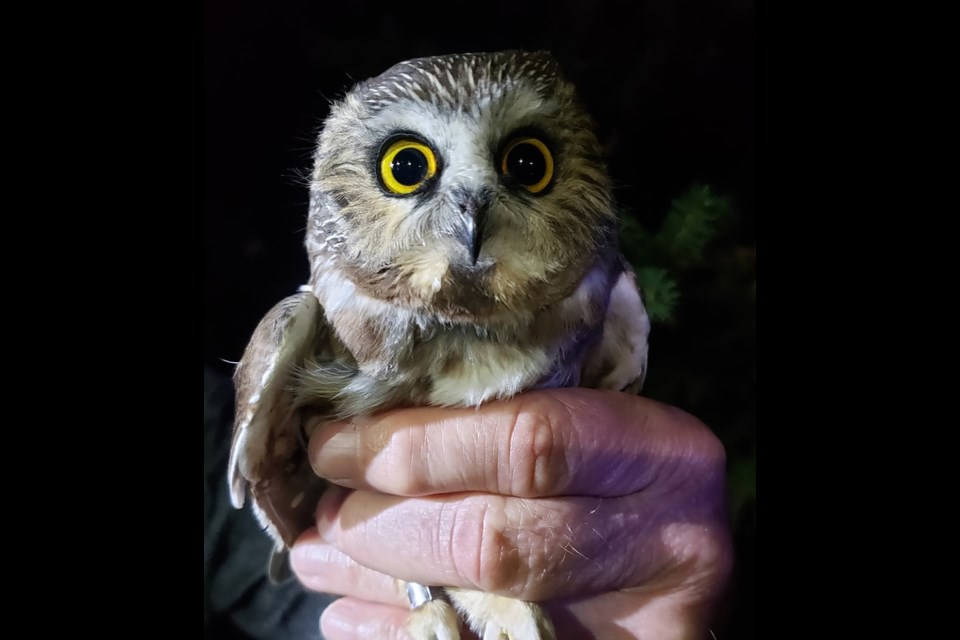From devastating fires to heat domes and cold snaps, climate change has encroached on critical breeding habitat and shows signs of disrupting migration of birds in Alberta.
By the middle of June this year, Alberta Wildfire estimated the area burned by wildfires in the province was 1,400,021 hectares, greater than the previous seasonal record set in 1981. This intense start to fire season came at the same time birds that breed in the Boreal forest were getting ready to hatch and raise their young, and could have prematurely pushed them from their nesting grounds.
“One of our big questions was the timing of the wildfires,” said Jana Teefy, head biologist at the Beaverhill Bird Observatory near Tofield.
“Did it start before or after a lot of our birds were able to successfully breed and raise their brood? The timing can play a huge factor in whether or not the breeding is successful year to year.”
“I'm curious to see as our season wraps up if that affected their brooding success or even their brooding location,” she said.
Over 300 species rely on the Boreal as breeding ground each year. The extent of wildfire impacts on bird populations is as yet inconclusive, but Beaverhill staff noticed anomalies as soon as songbird banding began in July.
“We had an unusual number of Boreal warblers caught early in the season,” said Geoff Holroyd, chair of the Beaverhill Bird Observatory.
“And the Tennessee warblers in particular, at least at the start of the migration, were virtually all adults. One can speculate that they failed to breed,” when they escaped the fires, Holroyd said.
“We actually had so many that we ran out of their band size and had to order more,” Teefy said. “We were getting consistently over 30 a day, which is very unusual for us.”
Arriving a few weeks earlier than expected, Holroyd reasoned they were driven out of their breeding ground by the fires and had to go elsewhere. “The lack of hatch, or young of the year, is problematic,” he said.
Though the first grouping was mostly adults, some young did eventually trickle through the monitoring site, Teefy said.
Jody Allair, director of community engagement for Birds Canada, said that he hadn’t seen data from Alberta’s bird observatories for this year, “but as you can well imagine, the wildfires most likely had a significant regional impact on nesting birds this past summer.”
“However, it’s still quite early to know for sure what the long-term impacts will be on the migratory birds that nest within the Boreal and Montane forests of Canada. This question is one we will be looking into going forward, and data sets like those collected at Canadian Migration Monitoring Network Stations will definitely play a role in determining impacts,” Allair said.
It’s not just songbirds that are being affected. Because of progressively warming seasons, the peak of Saw-whet owl migration has been on average two days later per decade over the last 20 years. This year, they arrived two weeks ahead of schedule.
The owls routinely staying longer in the north may make them more vulnerable to increasingly common extreme weather events, Holroyd suggested.
“One of the predictions of climate change is more severe weather. And we see lots of examples of that,” he said.
Holroyd pointed to last fall, when Alberta experienced the warmest October on record, shortly followed by record cold temperatures in the beginning of November.
“So that's one of the risks of the extreme weather is the birds get suckered in, in this case, to staying later, and suddenly there's a cold snap. And they should have cleared out of here and they didn't,” he said.
“We can't say for sure just what the impact was. But one can speculate that that is not a good scenario. If a species is looking to migrate to escape the cold and then gets hit with a cold snap, then that could cause trouble.”




